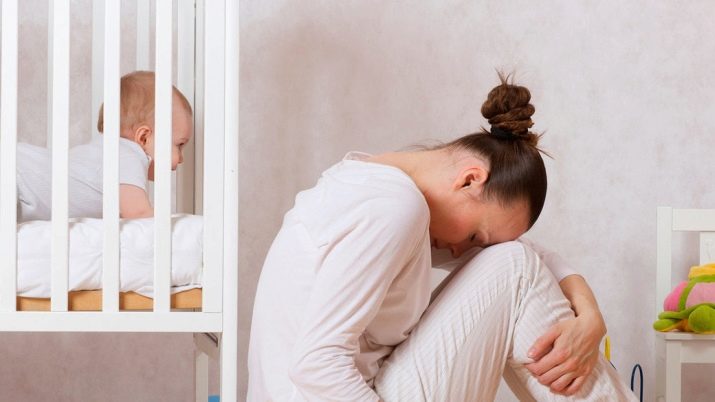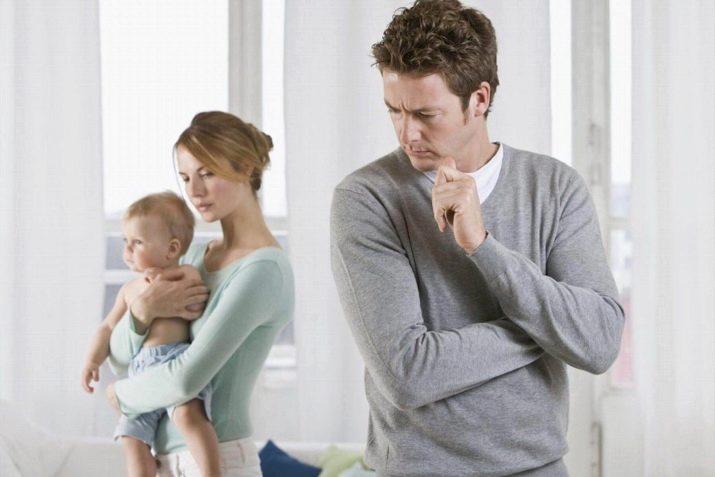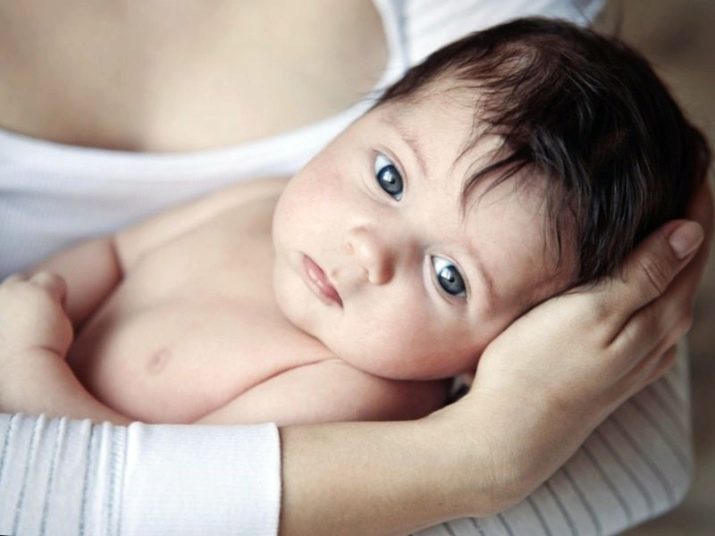All About Postpartum Depression

Pregnancy and childbirth are always stressful for the fragile female body. In addition, not every young mother can cope with the worries that have piled on her, lack of sleep and frequent nervous breakdowns. Some get depressed.
What is it and how long does it last?
Postpartum depression is considered a pathological condition of a female representative who became a mother some time ago. Depressive disorder is associated with metabolic disorders, the emergence of additional responsibility, an increase in household chores and the monotony of life. A woman's postpartum psychological and physical wasting is often referred to as postnatal depression.
During childbirth and childbirth, the body of a young person undergoes great hormonal and physical changes. The level of female sex hormones and endorphins plummets. The young mother is experiencing psychological discomfort. The duration of a typical blues can be from 3 to 5 days. During this period, a woman experiences tearfulness, anxiety and moodiness.

Most often, postpartum stress passes after half a month after the newly-made parent has adapted to daily activities and the fear disappears at the sight of the baby. A woman adapts to other living conditions and is no longer afraid to harm the baby with her careless movement.
Often, the stressful state smoothly flows into postnatal depression, lasting from one month to a year. The recovery process takes a very long time.It depends on the timely diagnosis and the start of treatment.
The delay in recognizing a woman's depressive state lies in the fact that poor mood, irritability, loss of energy are often attributed by close people to the natural whims of a young mother and a temporary reaction to stress from the birth process.

The duration of depression depends on the general atmosphere in the family. There is no need to reproach an inexperienced mother for poor performance of maternal responsibilities and insufficient attention to the baby. The blues will end quickly if close people provide the necessary support in time.
It seems to the young lady that she does not correspond to the role of the mother. The lady feels her own uselessness, feels a sense of guilt and shame. The woman feels the hopelessness of the situation and fear. In psychiatry, various suicidal cases and murders of an infant by a mother in a depressed state are described.
Sometimes the development of the disease occurs due to the reluctance of a young person to seek help from others or a specialist. Subsequently, postnatal depression can become chronic and last for 2-3 years.

The main symptoms
Not all women experience emotional and physical exhaustion in the same way. The degree of psychological depression depends on the factors provoking depression, the individual characteristics of the young woman and her attitude to the problem that has arisen.
Depression usually starts with a dull mood and sadness. The new mother feels chronic fatigue and mental emptiness. She does not want to communicate with friends and relatives. Periodically, somatic disorders occur, which are most often associated with disorders of the gastrointestinal tract or with the occurrence of headaches.

A young mother should pay attention to other symptoms characteristic of the disease:
- lack of vital energy;
- increased anxiety;
- panic attacks;
- frequent mood swings;
- irritability;
- uncontrolled outbursts of anger;
- hysterical seizures;
- feeling of guilt for unplanned nervous breakdowns;
- self-flagellation;
- a state of confusion;
- tearfulness;
- refusal of any outside help;
- lack of desire to do what you love;
- loss of interest in life;
- lethargy;
- poor appetite;
- sleep disturbance due to an influx of anxious and negative thoughts;
- weakened immunity;
- tachycardia, shortness of breath;
- inability to concentrate on simple things;
- impaired memory and coordination;
- emphasized indifference towards the baby or excessive care.

Causes of occurrence
After the birth of a child, young parents may feel depressed due to inadequate life experience. Often, the emotional and physical exhaustion of a woman occurs due to limited knowledge about the process of obstetrics itself, the conduct of life in the first year of a baby's life.
An important role is played by the hereditary predisposition of a young parent. Occasionally, postnatal depressive disorder is observed in the female line in all generations. This is due to the property of people with a weak nervous system to react sharply to stressful situations. The birth process and the birth of a baby are great stress for such a woman.
The unhappy atmosphere at home also leads to postnatal depression. A woman who has given birth is in great need of male support. And if she feels the indifference of her husband and the lack of help from relatives, then the young parent begins to feel depressed and despondent. Sometimes the general emotional background is affected by protracted conflicts with their own mother in adolescence or already at the present time.

Fatigue can occur due to metabolic disorders, surges in female sex hormones, changes in blood volume and blood pressure. Addiction to alcohol, tobacco smoking, drugs and other bad habits often provoke depression in men and women. For this reason, depression can occur at the same time in the wife and husband.
In some cases, postnatal male depression is in some way related to the same factors as in their wives. The spouse does not experience hormonal and physiological changes in the body, but the need for revision in a short time and making adjustments in the financial, sexual and psychological spheres contributes to a decrease in the general emotional background and a significant decline in mood. Postnatal depression of a young father affects the further development of the baby's psyche. In order to preserve the child's mental health, a man should promptly seek help from a psychologist.
Sometimes postpartum depression can be associated with a woman's selfishness. The lady does not want to rebuild the usual way of life. Some women are unable to take responsibility for raising a little man. Often a lady who has given birth to her first child does not want to share the attention of others (especially her husband) with a funny little one.
After the second birth, the woman's selfish attitude usually goes away.

In addition to the factors described above, psychologists identify other common reasons:
- increased level of responsibility;
- lack of funds;
- lack of free time;
- heightened perception of the external environment;
- problems with a partner;
- awareness of the unknown role - the mother;
- lack of experience in raising children;
- physiological changes;
- fear of changes in the figure;
- breastfeeding problems;
- inconsistency between desired events and reality (lack of expected support from a life partner, the birth of a daughter instead of the planned son, and other unexpected moments).

Form overview
Only specialists can correctly assess the condition of a woman after childbirth. To identify mild, moderate or severe depression, psychologists and psychiatrists conduct specialized diagnostics. There are effective techniques.
The Edinburgh Scale helps to identify the level of depressive disorders in the prenatal and postnatal periods. The expectant mother or young mother is offered a questionnaire with 10 statements and four answer options. The woman should check the item that best matches her condition during the last week. They give 5 minutes to take the test. After that, the psychologist processes the results, determines the presence of depression, its form. Then the specialist outlines ways to deal with it.

Neurotic depression
Childbirth can exacerbate pre-existing mental disorders. The newly-made mother is experiencing her own insolvency and dependence. A sharp drop in self-esteem drives her into emotional dependence on the people around her. The development of neurosis is accompanied by anger, aggressiveness and hostility towards others.
A woman's sleep and appetite are disturbed, sexual attraction to a partner disappears, panic attacks and suspiciousness about her own health appear. Occasionally, profuse sweating occurs, blood pressure rises and heart rate increases.
A neurotic person has 2 extremes: a lady may not pay attention to her hairstyle and dress untidy, or, conversely, overly carefully monitor every detail of her own appearance and order in the apartment. In the latter case, carelessly folded sliders or an accidentally broken nail can become a tragedy for her.

Postpartum psychosis
A severe form of mental disorder requires the immediate intervention of a psychiatrist, as the consequences can be tragic. Postpartum psychosis is one of the main reasons for killing a baby or causing him grievous bodily harm, since the mother's delusional ideas are directed towards the crumbs. Depression usually occurs in the first 2 weeks after childbirth. It is accompanied by strong excitement, spasmodic and confused thinking, loss of inhibition.
A woman may experience hallucinations, paranoia and various delusions. Some people lose the ability to recognize loved ones.
The young mother needs urgent hospitalization. Acute symptoms last up to 3 months. During this period, suicides sometimes occur. It can take six months or even a year to recover from a mental state.

Prolonged postnatal depression
The victims of prolonged postpartum depression are usually women who have not received enough parental love, tenderness, affection in childhood, as well as individuals with hysterical manifestations or obsessive fears. They are not happy with the very process of caring for the baby, taking care of him. Irritation alternates with feelings of guilt because of the seemingly own failure.
The problem can be difficult to recognize due to the disguise of depression under the everyday chores associated with raising a child. New mom often cries.

Effects
The painful condition of a woman is reflected in loved ones and the baby. A young lady in a bad mood cannot concentrate on her direct responsibilities. An inadequate reaction is expressed in the unwillingness to take the baby in his arms, to feed him with breast milk. For this reason, the baby does not gain weight well, develops slowly. The kid is anxious, does not get enough sleep. This circumstance has a negative effect on his child's psyche. Lack of tactile and emotional connection with the mother leads to speech disorder, hyperactivity, or, conversely, lethargy.
The husband of a depressed person may not always be aware of the psychological problem of his chosen one. He considers inappropriate behavior of his wife a whim. Due to the radically changed family structure and the lack of an intimate relationship, a man feels his uselessness. The child's father needs to be patient. You should not insist on intimacy, but you should surround your soulmate with care and affection.
The husband needs to take an active part in caring for the baby: bathing him, putting him to bed, walking on the street. Moral support protects the chosen one from excessive anxiety, prevents depression from spilling over into a protracted state.

How to get rid of yourself?
Depression and general depression can be overcome with the right distribution of responsibilities. Do not try to immediately establish the old way of life. There is no need to grab several things at the same time. Don't force yourself. Gradually, comfort and order will be restored. At the moment, it is much more important to devote more time to the baby. He needs your constant care, love and warmth.
Agree with your husband to temporarily end intimacy until the female organs are fully restored after delivery. This delicate topic requires tact.
A mutual decision to postpone with an intimate life improves the general psychological background of a woman, helps her to overcome the blues.

A young woman can cope with a depressive state on her own if the following recommendations are followed:
- eat a balanced diet at the same time of day;
- do not give up playing sports;
- spend more time with your child in the fresh air, take walks;
- take care of your appearance;
- if you do not get enough sleep at night, sleep with your baby during the day;
- periodically retire from everyone and relax;
- Set aside at least a third of an hour daily for personal needs;
- do not scold yourself or blame yourself for anything;
- do not try to take on all household chores;
- allow yourself to pour out all your negative emotions;
- take baths with scented essential oils more often;
- listen to pleasant music;
- train yourself to focus on the positives;
- do not treat the child as a source of negativity.

You can fight depression using meditative techniques. Holding your breath for 10-20 seconds can bring relief. There are special sets of exercises designed to restore the body after childbirth. If you do them daily, you will quickly regain the lost shape.
When relatives can sit with the baby, be sure to go to the hairdresser, meet with a friend, go shopping.
If you cannot overcome depression at home, you do not need to give up psychological help. In severe cases, you should consult a doctor. The psychotherapist will select the appropriate technique with which the young mother can overcome her illness. Sometimes you have to resort to medication. The psychotherapist's advice will help you get out of a depression in a timely manner.

Preventive measures
All pregnant women are advised to attend courses for future parents. The antenatal clinics tell you how to strengthen the bond between the mother and the baby and avoid postpartum depression. Specialists help a woman prepare for the birth of a baby. Adequate activity and healthy nutrition of a pregnant woman is also important.
In order to prevent a depressive state, a specialist must promptly identify all risk factors. Whether the pregnancy was planned or undesirable. Whether there have been miscarriages or the birth of a still child before. Did you experience any stressful situations during pregnancy? Whether there was any psychological or physical trauma during childbirth. In addition, it is necessary to find out the family history of depressive disorders, the material wealth of the family, the severity of the premenstrual symptoms and the existing hormonal imbalance.
The psychologist, together with the expectant mother, draws up a table in which the necessary actions of the father and mother are prescribed, the individual area of responsibility for various moments is determined. Preventing postpartum depression necessarily involves discussing a parent's new role.

The head of the household plays a major role in the prevention of postnatal depressive disorder. He should take into account that his second half after childbirth increases sensitivity and anxiety. The young father should take on some of the child's care. A new mother who spends most of the day alone with her baby is at risk of postpartum depression.
Emotional support from family and friends is important for a woman so that she can adequately go through new sensations and unfamiliar circumstances.
Relatives and girlfriends help the young mother not to get depressed, giving her the opportunity to relax and switch to other interesting things.









